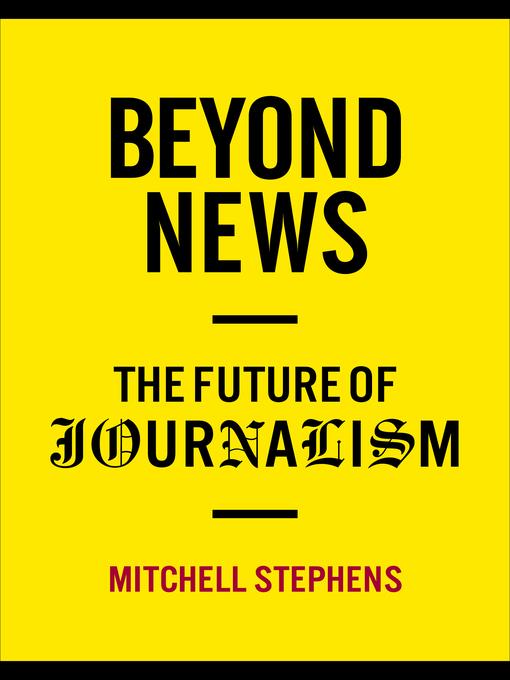
Beyond News
The Future of Journalism
کتاب های مرتبط
- اطلاعات
- نقد و بررسی
- دیدگاه کاربران
نقد و بررسی

August 4, 2014
Stephens, a professor of journalism at New York University, questions what should be next for modern journalism in the demanding digital age. He explores options for a news industry to revamp and retool, noting that journalists must "return to an older and higher view of their calling." With the Internet, the news business requires not only collecting facts and details of events, and opinionated views, but a need to practice "wisdom journalism" â thoughtful judgment, insight, and informed argument â which is sometimes lacking in current media. The book's astute observations, supported by historic writings of theories and principles, offer the reader various ways to approach the challenges and obstacles confronting the media's content, distribution, and quality then and now. Rather than stressing the dominance of technology, Stephens addresses the preparation, expertise, fairness, and reliability of journalists who present the information and arguments to the consumer. Stephens, not one to say he has all the answers, admits in his remarkable survey on media that "journalism can and must improve will remain vulnerable to hastiness and the passions of the moment." For information buffs, this is a feast, intelligent and candidly forthright.

March 1, 2014
A professor makes what will seem to some a radical suggestion to disconnect journalism from news, but he belabors the obvious in making the argument and offers little suggestion for a business model that might support his vision of journalism's future. NYU scholar and author Stephens (The Rise of the Image, the Fall of the Word, 1998, etc.) contends that the future of journalism no longer lies within the hallowed ground of reporting, objectivity and facts. Facts are everywhere in the age of the Internet, as is news, and almost all of what journalism once commodified is available for free. So, what now, and what's next? The author argues for the sort of analysis (he prefers interpretation) that is in fact widely practiced and that goes beyond who, what, when and where to focus on why and how. His "call for more interpretation in journalism" further suggests that the future of journalism is in the hands of specialists--maybe even scholars and public intellectuals--where journalism has traditionally regarded its reporters as generalists. What we need are "wisdom journalists, looking not for news but for the meaning and consequences of that news." Editors have generally been moving in that direction anyway, as social media has made even the 24/7 TV news cycle seem a little dated. Further, the Web is rife with analysis and interpretation--journalism that provides expertise, depth, context and substance--as well as opinion and "facts" (some of which are skewed or prove to be simply untrue). Stephens' confidence that readers "haven't had all that much difficulty filtering out the foolishness" isn't necessarily warranted, as spin becomes increasingly polarized and lies go viral. But even if each of us is qualified to serve as a gatekeeper, where is the revenue to support the wisdom journalism of those who might have once been employed by the sort of news organizations that this book suggests are obsolete? Like the news itself, an analysis that must be read with a critical eye.
COPYRIGHT(2014) Kirkus Reviews, ALL RIGHTS RESERVED.

May 15, 2014
Stephens (journalism, New York Univ.; A History of News) offers "an alternative understanding of quality in journalism." He explores how the profession has changed over the years and considers how it can evolve further. Wisdom journalism is his term for developing a new standard that goes beyond simply reporting the news. According to the author, the five Ws (who, what, where, when, and why) are not enough of a base to report a story in the newspaper now since there are so many other outlets online or via television that will make the information available earlier. Questions are posed regarding objectivity and balance and moving beyond a "just the facts" approach to a more interpretive analysis. Immediacy is also discussed, using the example of the SCOTUS (Supreme Court of the United States) blog and its coverage of the Supreme Court decision on health- care law in 2012. Other issues examined are immersion, opinion, insight, and even snark. Many journalists, such as Lincoln Steffens, I.F. Stone, Bob Woodward, and Carl Bernstein, are featured in short excerpts. VERDICT Definitely of value to journalism students, this book will also appeal to those interested in access to informed perspectives and the fate of the "fourth estate."--Barbara Kundanis, Longmont P.L., CO
Copyright 2014 Library Journal, LLC Used with permission.

























دیدگاه کاربران